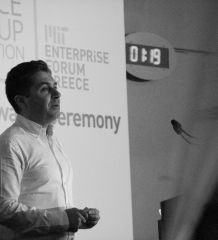ANTONIS ARMOUNDAS
Assistant Professor of Medicine/Harvard Medical School at Massachusetts General Hospital
Professional experience
Antonis A. Armoundas was born in Mytilini, Greece. He graduated from National Technical University of Athens, Department of Electrical Engineering, in 1991 and received the M.S. degree from Boston University, Department of Biomedical Engineering, in 1994. He received his PhD degree from the Massachusetts Institute of Technology (MIT), Department of Nuclear Engineering, in 1999.
Currently he is a member of the Cardiovascular Research Center (CVRC) of the Division of Cardiology at Massachusetts General Hospital (MGH) and an Assistant Professor at Harvard Medical School, while he maintains an appointment at the Harvard-MIT Division of Health Sciences and Technology at Massachusetts Institute of Technology. CVRC is among the most active and academically productive research centers in the world, involved in ground breaking research in stem cells, genetics, genomics and physiology. Ηe actively participates in all activities of CVRC. Οne of the main priorities of CVRC is the training of young students and fellows and a lot of his effort is spent in their teaching and supervision and of their research and academic quests. Given, his background as a Biomedical Engineer, his research is mainly applied. His research group is poised to make significant contributions to the understanding of mechanisms of arrhythmogenesis from the cell to the patient level and design novel therapies that would prove clinically effective. Overall, the strong collaborative efforts among the faculty in the Division, as well as the complementary nature of our scientific and experimental approaches provide him with a very fertile environment to develop and advance his research program.
His research interests include biomedical signal processing, forward and inverse problem solutions and cellular electrophysiology methods (experimental and modeling). Specifically, the Armoundas Cardiac Electrophysiology laboratory at CVRC, takes a vertically integrated bench to bedside research approach that dissects cardiac electrophysiology problems from the cell to the whole organ level. The primary purpose of the laboratory is to develop novel signal processing algorithms that aim to improve the diagnosis and treatment of cardiac disease. Currently, the laboratory has active research projects in (i) designing closed-loop anti-arrhythmia therapy following the detection of T-wave alternans; (ii) developing Smart-phone based algorithms and applications for cardiac and respiratory monitoring; (iii) developing novel methods for guiding the ablative therapy of cardiac arrhythmias; (iv) investigating the role of calcium cycling abnormalities in cardiac disease, with an emphasis on heart failure and arrhythmia susceptibility; (v) understanding the spatio-temporal interaction of cardiac mitochondria; and (vi) developing markers/predictors of atrial fibrillation. Also, the laboratory has expertise in patch clamping, immunofluorescence microscopy, and numerical modeling.






